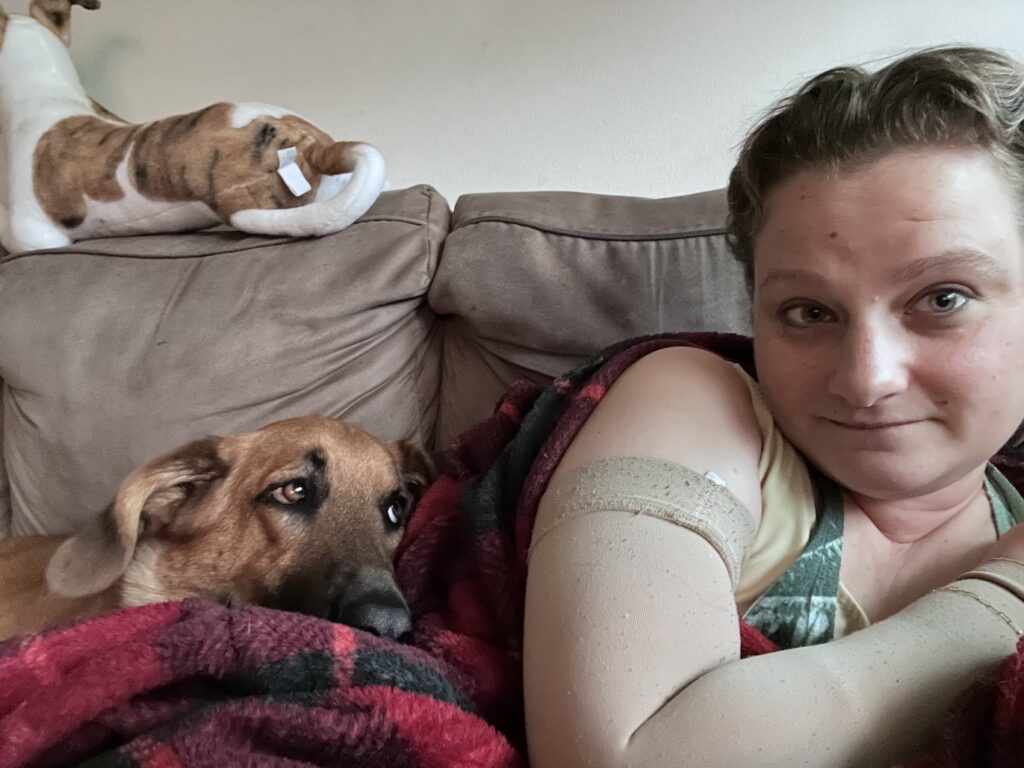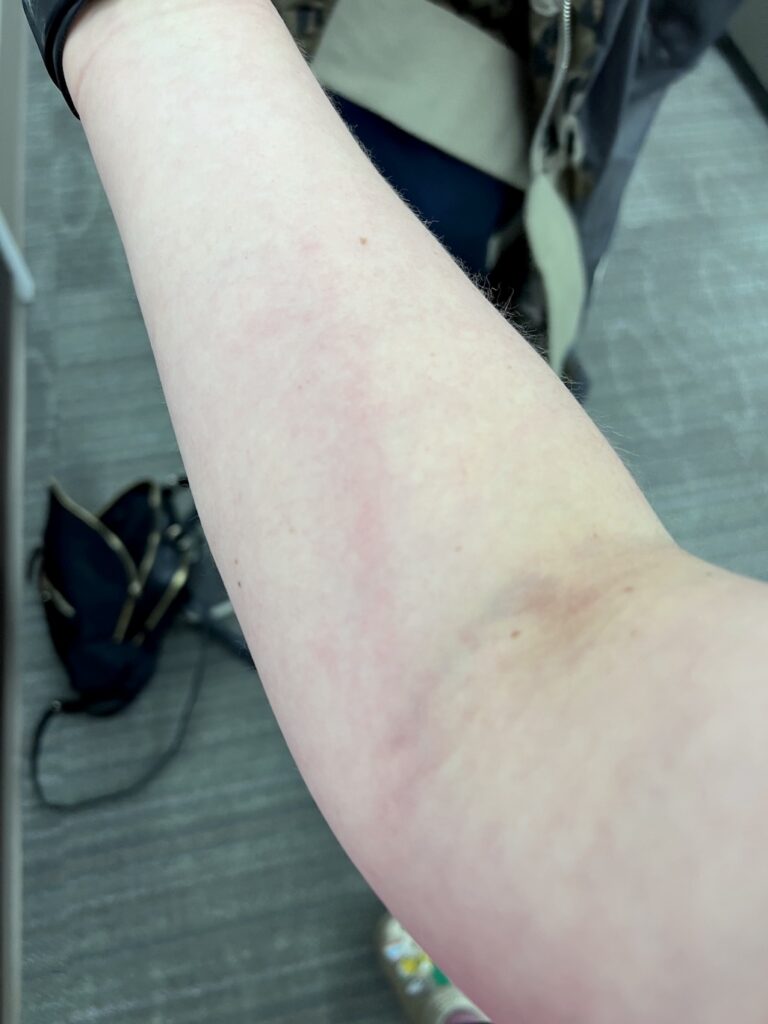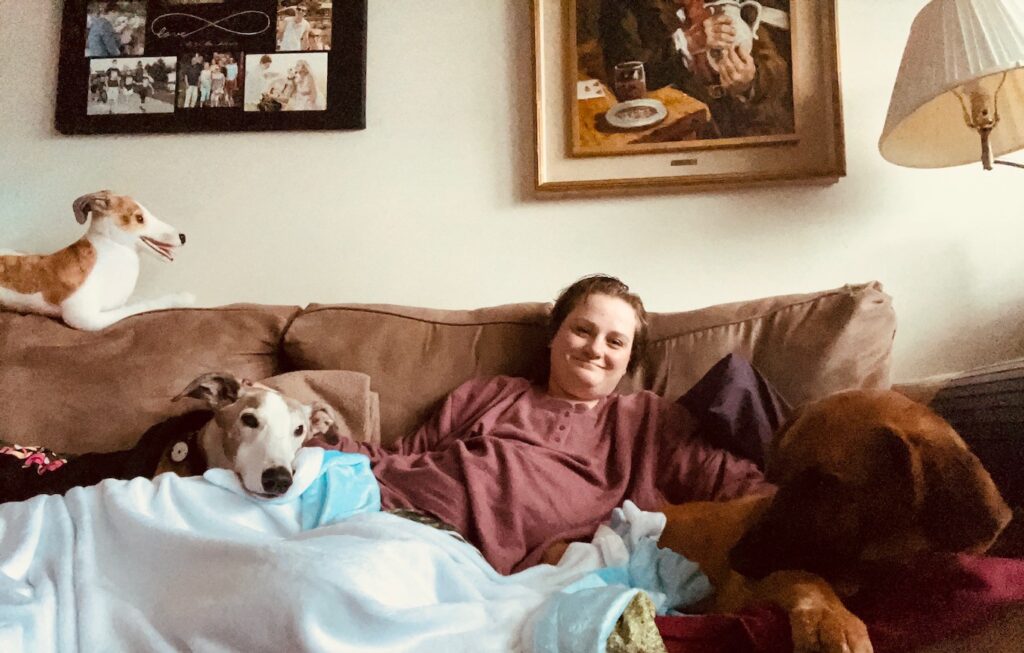March is Lymphedema Awareness Month and
March 6th is World Lymphedema Day.
Lymphedema. Something I was terrified of even before my first treatment. Something I can hardly spell, and now share a very intimate relationship with. What is lymphedema? To understand what lymphedema is you have to know what the lymphatic system is and its purpose.
What is Lymphedema?
At the most basic: the lymphatic system is a network of little tubes called lymph nodes. The lymph nodes pick up the waste cells produced, while also bathing them in proteins and white blood cells needed to fight infection. In lymphedema, there is a disruption in the little tubes or lymph nodes. That disruption creates a build up or blockage of fluid, which can result in swelling, pain, increased infection risk and decreased joint mobility.

While that doesn’t sound like that big of a deal, lymphedema is quite disruptive to many cancer patients’ lives, including mine. That is because lymphedema is a lifelong side effect that continually builds upon itself, getting worse as time goes on. To understand that it builds upon itself, imagine the lymph nodes as a garden hose.
Lymphedema is caused when someone steps on that hose blocking the water’s ability to leave the spout. Slowly the foot blocking the hose gets heavier and heavier creating a bigger buildup of fluid behind it with no outlet to be found. As you can imagine, that is going to back up into your foundation, eventually leaking into your house and causing all sorts of issues, because some jack-off is standing on the hose creating this problem.
Now you might say, “Well, just get that person off the hose!” I love that idea, but cancer treatment is the person. What’s been done is already done. There is no moving that person; meaning there is no curative treatment to lymphedema. There is only trying to convince that guy to ease up a bit and let more water through. Which, if you’ve ever tried to convine a man of anything you know it’s costly, takes a lot of time and emotional energy, and is overall simply annoying and frustrating.
And that’s lymphedema, in a very concise and simplified explanation. Personally, I had a pretty mild case of lymphedema. I have Doctor Figy and luck to thank for that. First—since it’s March, let’s talk about luck. I’m lucky, because I had so many risk factors for lymphedema but have had a mild case (up until recently, but more on that later).
Lymphedema + IBC
Inflammatory Breast Cancer likes to hang out in the lymph nodes, creating its own blockage from Day 1. The more lymph nodes that have cancer before treatment begins also increases the risk for lymphedema. I had the highest level of involvement before treatment began. Taxol chemo is associated with higher lymphedema rates, which was the last IV chemo I received. The more lymph nodes you have removed increases your risk of lymphedema.
Personally, I had the second highest amount Dr. Santamaria has ever removed—54 total removed. Another thing that increases lymphedema risks is radiation, which I had 32 rounds of; again about the highest amount you can receive as a breast cancer patient. I was really only missing race (as lymphedema is more prevalent in black women) and cancer subtype, as lymphedema is more prevalent in HER2+ patients, due to the treatments they receive.
Even without those last two risk factors, I’d say the odds were stacked against me. Could I have done things differently to minimize my risk? Absolutely. But I’d rather be alive with lymphedema than dead without. Quite a catch 22 if you ask me.
Props to Dr. Figy
Now to Dr. Figy. Quite the guy as you all know. He suggested he do a lymphovenous bypass surgery when I had my mastectomy. What he did was reroute one of my lymph nodes directly into my circulatory system. This allows the lymph fluid to go past the blockage and drain. This can greatly reduce the symptoms of lymphedema, such as swelling. Swelling that causes pain and mobility restrictions.
Dr. Figy was very upfront and honest with me that the odds were against me and to not expect to wake up without any lymphedema post surgery. He also was very honest that each person’s body responds very differently to this surgery. Some it results in an almost curative feeling, others it can take over a year to have results, and some people it doesn’t help at all. A chance was a chance to me though, and I said, “I’ll be asleep anyway! Go for it”. Which he did! And I believe this is a huge reason why I had very mild lymphedema up until last week.
Wednesday Stress

Last Wednesday I woke up in the morning with a red streak going down my arm. Being a nurse, and a very well-educated cancer patient (thanks to an amazing team and a little bit of Dr. Google), I knew I was in danger. I knew I had an infection in my arm.
When the body has a foreign invader it likes to scream. It screams by turning red, is swelling and causes pain. That’s true pretty much anywhere in the body. Think about when you have a sore throat. That pain and redness in your throat is your body’s way of telling you there is an invader. In normal circumstances your lymphatic system will respond to that screaming, sending white blood cells to fight the infection, and life moves on. It’s quite a different story when the infection is in your lymphatic system itself, like what I woke up to on Wednesday morning.
After a stress-filled few hours, including a scan to make sure I didn’t actually have a blood clot, I was started on oral antibiotics. Honestly this made me a bit nervous. In nursing school, and throughout the cancer community, everyone is always saying that when you have cellulitis, you need IV antibiotics or you’ll go septic. Going septic means the infection is in your blood. Once the infection is in your blood, it can spread everywhere and you die.
Sepsis is something that needs to be treated swiftly and appropriately with IV antibiotics, but I wasn’t septic or showing any signs of going septic. My infection was localized to the obstructed lymph nodes so conservative treatment made sense. There’s no reason to bring a grenade to a knife fight.
What Was It?
Having it drilled into my head from so many sources that I was at risk of dying, I was obviously very nervous. Being nervous leads me to science, because science always calms me down. I knew that calling my infection cellulitis wasn’t exactly right. Cellulitis is an infection of the skin and it was very evident to me that the infection was localized in my obstructed lymph nodes.
I know that it was the spot of the obstructed lymph node, because of the fancy green dye test Dr. Figy did back in December. So I reached out to him and told him what was going on. He then told me about dermatolymphangioadenitis or DLA. DLA is a localized infection of a blocked lymph node. Sounds pretty spot on if you ask me and why he’s paid big money.
For my science friends, I feel like DLA is often called cellulitis when it’s not. It doesn’t make any difference in treatment as you need antibiotics for both; it’s just an inaccurate description that may lead patients to not seek care for “just a red mark,” when in fact they do need quick treatment to not turn into something more, like sepsis.
Figy put me on activity restrictions until the swelling and redness go away. While the redness has subsided, the swelling has not. In fact the lymphedema is now ever so slightly pitting. In my mind that means my lymphedema is progressing as a direct result of this infection, which is a big bummer and why lymphedema awareness day is such a big deal to me.
Long Term Side Effects
People don’t realize the long term side effects that come from cancer treatment, like lymphedema. They don’t realize that I’m just sitting out here with a painful, swollen, infected arm, that’s making me just as tired as anyone else with an infection, but I look “normal.”
Non-cancer-affected people don’t realize the mental load that it takes to try and determine what you can and can’t do to make long term side effects like lymphedema better or worse. How one night you go to bed thinking you’ll be having a normal Wednesday and then cancer finds a way to rear its ugly head again through lifelong side effects.
It sucks. It’s my reality. It’s a lot of my cancer friends’ reality and why I will always be a voice to educate on the long-term effects of cancer treatment. Remember dear warriors, you never know what someone is going through, so please try to be compassionate, patient and understanding. And if you have the time, like you did today to read this, go find out.
Ask your friends how they are doing, what are their struggles, and how can you help them. Sometimes it’s just listening, understanding and educating, like you have done by reading today. So thanks for taking the time to learn all about my woes and as always….have a magical day.

As always, I appreciate your willingness to share your experiences on your journey. I have learned a lot from you. I imagine that it takes both physical and mental energy to do that — especially when you don’t feel well.
Once again, to use your words, “spit on!” Ha ha ha ha—typo, subliminal perhaps. “Spot on” but “spit on”-not to underplay the importance of “ saliva” is an important attitude in cancer treatment, a visual to focus on ridding oneself of a threatening and powerful invader.
I plead with you, again, Julia, to publish a booklet with your blogs. There are women who would benefit so much from your knowledge and attitude. The insights you describe and define could reach so many and would likely be an integral part of healing , perhaps simply by understanding the complex science of cancer and its physical and psychological effects. Knowledge is power. You, Julia, are incredible!❤️
I agree with Coleen. A booklet of your blogs would be beneficial to those new to cancer as well as their support team. Even those who have been through it all would probably benefit, especially when it’s something that they could potentially encounter such as lymphedema. I appreciate you sharing your experiences and knowledge. I’m so glad you found such a good team of doctors to treat you! You are very fortunate! I’m sorry you’re having to deal with the lymphedema. I hope it resolves and you feel better soon. Thanks for sharing your knowledge and journey with us!
I’m just so glad they were able to get to the bottom of it. What a scare! Thank you for bringing awareness to one of the most disturbing side effects of cancer treatment. I echo the desire for people to be more compassionate and not assume all is well because our hair has grown back. This beast left invisible damage that we will have to deal with for the rest of our lives. Take good care. Proud of you JJ!💜